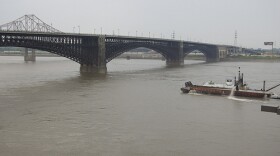-
The city of Kimmswick was depending on a port recently opened to riverboats to boost its economy, but with Mississippi River water levels near record lows, few of the boats are stopping there.
-
Barges are moving along the Mississippi River much more slowly and with lighter loads as they try to get corn and soybean harvest to ports.
-
People have lived along the Mississippi River and its tributaries for millennia, but levee systems built in response to past disasters aren't designed for the newest risk: increased rainfall caused by climate change.
-
The Nature Conservancy is receiving a $30 million pledge from Enterprise Rent-A-Car Foundation to sustain freshwater systems around the world. Conservancy leaders say the money will help support rivers threatened by climate change and pollution.
-
The 11th annual Mississippi River Cities and Towns Initiative meeting comes at a critical moment when a changing climate is ratcheting stress on the nation's largest river network.
-
The potential project could bring the city’s first marina to the north St. Louis riverfront. It would also add a hotel, waterpark and indoor trampoline park to a 70-acre plot of land north of Interstate 270, just within city limits.
-
Federal and state agencies spend millions of dollars every year to keep destructive invasive carp out of the Great Lakes. Meanwhile, at least 25 destructive species — like water fleas and bloody red shrimp — are inching closer to the Mississippi River Basin.
-
Las agencias federales y estatales gastan millones de dólares cada año para mantener las carpas invasoras destructivas fuera de los Grandes Lagos. Mientras tanto, al menos 25 especies destructivas, como pulgas de agua y camarones rojos sangrientos, se están acercando poco a poco a la cuenca del río Mississippi.
-
The invasive fish species known as Asian carp now goes by “copi,” in an effort to get more of them out of Midwestern waterways and onto the dinner table.
-
Lake sturgeon are ancient creatures that have survived cataclysmic events over millions of years. But scientists worry they might not survive us.
Play Live Radio
Next Up:
0:00
0:00
Available On Air Stations








